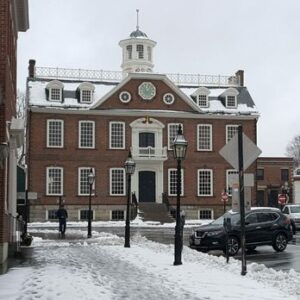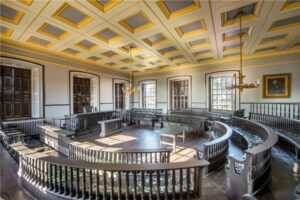Americanism Redux
January 4, 250 years ago today in 1773
(Colony House, Newport, Rhode Island)
Clean out the room where the hearing will be held. Do the work.
Sweep the floors. Wipe down the seats and the rails. Stack firewood. Candles at the ready. Make sure nothing from the first floor works it way up the stairs to the second floor. First floor: the marketplace, scene of money and goods changing hands. Second floor: the court room, scene of tomorrow’s hearing and God knows what else—shouting, shoving, cursing, spilled blood, broken bones, dead bodies. No one knows for sure.
(where they’ll meet, second floor)
The Newport Colony House in Newport, Rhode Island will be the center of something tomorrow. Five men in white powdered wigs, dressed in formal attire, will take their seats as the Royal Commissioners of Inquiry. Their task will be to start the official imperial investigation into last summer’s burning of a British naval vessel charged with enforcing trade laws. No one has been punished in the intervening six months. These five men, drawn from political offices given to them by British authorities in London, will have powers to call and question witnesses and also transport, forcibly, selected people to England for further interrogation and potential indictments. They may also request help from British military units stationed in the region.
Today, 250 years ago in the streets of Newport, rumors fly from house to house, tavern to tavern, ship to ship. “Protestors organizing to disrupt the hearing.” They may also target the five officials for intimidation, harassment, and violence. They may be armed with guns, knives, rocks, bricks, and long wooden clubs. Mad as hell, liquored-up, heart pumping with a grudge gone to glory. Or something like that.
There will be hundreds of people surrounding Colony House. Coats, hats, scarves, gloves, chilled breath and fingers and toes and cheek bones. Inside the House, heat will rise from fireplaces and candle holders. Winter garments off, people will mill about, packed in the first floors or heading upstairs to the second floor where the gavel will slam, the session called to order, “God Save The King” will be yelled by some and muttered by others. And the whole damn thing will begin—At the time of the attack on the HMS Gaspee, where were you, who said what, who did what, who planned what? They’ll sit in their seats, the five men, the witnesses, the onlookers stuffed in the galleries.
But before tomorrow’s hearing is today, 250 years ago, outside the now-cleaned Colony House, the air is heavy with cold and dampness. Off shore, winds rush at the ocean surface. The top of the salt water responds in waves capped in a whitish mist.
Also
(Hannah Winthrop)
In Massachusetts, Hannah Winthrop has her mind made up. Living in Boston, she writes to a local friend. She worries about her “once happy Country” and admits to having thoughts “too often apt to gloomy Ideas.” Her gloom feeds off her expectations: Hannah doubts if the new Committee of Correspondence will succeed in defeating opinions that favor the British King and Empire over colonial rights. These opponents are, she writes, “Precipitately madding on to their own destruction.” (Interesting word that, madding.) Worse than that, Hannah is further troubled by “the Ministerial Mandate to the Newportians for transporting them a thousand Leagues for Trial.” Worst of all, in thinking about sacrifices of past generations—her parents, grandparents, and great-grandparents—Hannah ruminates over “their Sons, who set so Little Value upon the dear bought purchases with displeasure.” Our youth aren’t up to it, not to what tomorrow will bring at Newport Colony House.
In her home not far from the troubled ocean, Hannah Winthrop fears for the future that begins this week.
(those troubled waters)
For You Now
As I write today’s entry, I was shocked at the junction of two widely separated events, the Newport Colony House hearing of January 5 and the US Capital certification of Electoral College votes on January 6. I really hadn’t thought of it until now. I make no point in saying that. I only draw your attention to it and to the respective January 4s of those years. They were a pair of days when rumors were rampant, facts were few but perhaps not as few as assumed, and the waters of the unknown lay ahead. A fast current can be fun to ride or the cause of overturning.
You do need to know this: no riot happened the next day at the Colony House or any day thereafter in the weeks-long hearing. The five men on the Commission did reasonably good work in questioning and concluding. Basically, no witness claimed to remember much of anything. Faced with that, the Commissioners huffed and puffed but purposely kept their fingers loose as the chord slipped through. No charges. No removals to England.
But life is life and waters are the River before they are the ocean. Then, no one was satisfied with the outcome, not the pro-colonial rights side or the pro-empire side. No one. Everyone was unhappy and utterly convinced the other side was thristing for blood. To back down from such a height, or to rise up from such a depth if you prefer, will take something more than an event like the Commission, where the main outcome was what didn’t happen (no riots, no guilty verdict). None built upon the log wedged into the bank.
How about us? Are we able to see the success and the promise of the result that didn’t happen? Or are we too far along on the track—whatever that represents—to understand its potential? Yet again, perhaps we’re not even along the track at all to the point where we should despair. Your call.
You’ve seen where Hannah stands on it. How about you?
Suggestion
It’s the first week in the 250th year after Hannah, after the day before the hearing at Newport’s Colony House. What does your letter to a friend say right now about the River ahead?
(maybe your letter will be on a screen)












